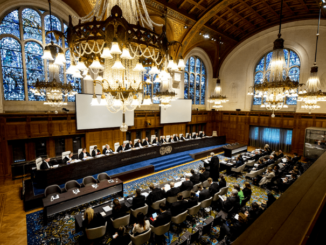
By Jamal Kanj
Despite his rhetoric against Israel, Assad was predictable and well contained by Israel than what the change might bring.
The rapid collapse of Bashar al-Assad’s regime has taken both intelligentsia and analysts by surprise. It was a repeat of the unexpected speedy fall of the Afghan government during the US military withdrawal from Afghanistan.
Both events share notable similarities: in Afghanistan, the government unraveled when its primary sponsor – the United States – decided to withdraw. Similarly, in Syria, Assad’s regime crumbled when his allies abandoned him.
However, contrary to Netanyahu’s narcissistic assertions that his attacks on Iran and the Resistance in Lebanon were a major driver in Assad’s downfall, Assad’s demise was largely due to his failure to confront Israeli belligerence in Syria and his abandonment of the Resistance in Gaza and Lebanon. Since October 8, Assad has behaved more like other impotent Arab dictators as mere observers of the genocide in Gaza and the war in Lebanon.
In fact, when the Lebanese Resistance chose to support besieged Gaza by occupying the Israeli army on the Lebanese front. Assad made it clear that he would not partake in the United Resistance Front battle. Even after the loss of leaders in the Lebanese Resistance, and earlier when Israel targeted the Iranian diplomatic mission in Damascus, he refused to retaliate against Israeli assaults.
Furthermore, to gain favor from certain Arab Gulf rulers, and according to reliable sources in Damascus, unlike during the summer 2006 war on Lebanon, the public was prohibited from openly expressing support or displaying pictures of Sayyed Nasrallah and flags of the Lebanese Resistance.
Assad miscalculated by assuming he could distance himself from the Lebanese Resistance, while believing they could not afford to lose him. His approach parallels the Democratic establishment in the US during the last presidential election, when they dismissed the anti-genocide voters, assuming they would have no alternative in Donald Trump as a president. In other words, Assad believed that, when compared to the alternative, he was indispensable. Eventually, his vain conduct turned him into a drag, not an asset, to the camp opposing Israeli intransigence.
The rift between Assad and his allies widened because of his determined intent to reclaim his seat in the Arab dictatorship club, AKA Arab League. Notably, his first reconciliation was with the United Arab Emirates leader, the Godfather of the Arab normalization with Israel. Assad’s strategy hinged on self-preservation—warming up to Gulf dictators while dangling the “scary” alternative to blackmail his allies.
In 2012, I wrote on the civil protest against the regime’s corruption, and how that evolved into an open war, fueled by foreign interference on both sides. Foreign fighters financed by the Arab Gulf States turned Syria into a fight of competing foreign interests, including Russia, Turkey, the US, Iran, and even Israel. The foreign intervention ultimately extended his regime, denying the Syrian people the opportunity to voice their grievances and pursue a peaceful political transition.
Following his victory, instead of addressing the legitimate demands of opposition groups who resisted being drawn into the military conflict, Assad squandered funds from foreign sponsors to strengthen his special security units whose only task is to protect him, at the expense of weakening the Syrian national army. He misinterpreted his bloody victory as vindication of his brutal policies to silence dissent.
While cloaking himself in lofty slogans and preaching Arab nationalism and resistance, Assad’s arrogance was reinforced by the so-called intellectuals eager to rationalize his cruelty in the face of foreign intervention.
More recently, the same pundits shamelessly defended Assad for not confronting Israeli aggression in Syria, Lebanon, and Gaza, attributing his impotence to Syria’s recovery from a decade-long war. Yet, Yemen, which emerged from an even more devastating war and, despite being under international siege, stood up to Israeli and Western might in defending Gaza.
In the end, Assad’s downfall became inevitable as his allies grew unwilling to support him as the fear of alternatives no longer outweighed his failures. When soldiers in his army refused to sacrifice their lives for a system riddled with corruption, his security forces crumbled as fast. A week before Damascus fell to the rebels, Assad secretly spirited his family and loads of money out of Syria.
Few days later, he fled for his life leaving behind those who had defended his regime to face their fate alone. For him, it was always about Bashar al-Assad’s survival, not Syria.
Despite his rhetoric against Israel, Assad was predictable and well contained by Israel than what the change might bring. That’s why following his fall, Israel terminated the 1974 agreement with Syria on separation of forces and occupied additional Syrian land. This could be part of Netanyahu’s attempt to create new facts on the ground to be used to exert concessions from the new government.
At the same time, Israel is seeding for the future conflict as Netanyahu expands his endless wars, targeting hundreds of locations inside Syria. In the absence of a Syrian air defense system, Israel seized a cynical opportunity to attack almost 500 sites destroying scientific institutions and research centers—mirroring the chaos created by Israel’s backers during the US occupation of Iraq. Israel’s only constant objective appears to be the dismantling of nations, leaving subsequent governments preoccupied with bedlam and turmoil. This pattern is evident in its actions in Gaza, Lebanon, and Iraq, and aligns with its broader strategy for Iran.
Meanwhile, the newly formed Syrian government faces a formidable challenge: navigating Western conditions to lift the illegal crippling sanctions on Syria. The US administration is likely to use this opportunity to extract political favors for Israel, a move that could most likely compromise the legitimacy of the new leaders and undermine Syria’s sovereignty.
Unfortunately, early signs from the new leadership are concerning. Their reluctance to condemn Israeli flagrant attacks raises real doubts about their ability to free Syria from outside influence and uphold Syria’s historical commitment to the Arab cause.
As for those celebrating Assad’s departure, it is vital to remember the lessons of Iraq, Egypt, and Libya to avoid repeating the same mistakes. Syria’s future depends on building a stable and just society while avoiding the pitfalls of replacing one dictatorship with another.
The new government must represent all Syrians, regardless of religion or ethnicity, ensuring justice and equality for all, while upholding Syria’s historic role at the forefront of resistance against Israel and its local agents.

– Jamal Kanj is the author of “Children of Catastrophe,” Journey from a Palestinian Refugee Camp to America, and other books. He writes frequently on Arab world issues for various national and international commentaries. He contributed this article to The Palestine Chronicle








Obviously this was ” regime change ” .
Read into: ” 7 countries in 5 years ”
a US government plan to destabilize said countries. They are: Iran, Iraq, Syria, Libya, Sudan, Somalia, Lebanon. Then later, Yemen. This is public info. We can clearly see that Wasrael is doing Uncle Sham’s dirty work.
We cannot forget the origins of the new leaders in Syria. Who won the victory against Assad, indigenous militias or foreign mercenaries?
More from Khameneis speech:
https://resistancenews.org/2024/12/16/khameneis-full-speech-about-syria-the-resistance-axis-will-prevail/
A powerful speech.
A statement from Al-Assad Extraordinary Arab and Islamic Summit:
https://resistancenews.org/2024/11/14/bashar-al-assad-arab-countries-are-complicit-in-the-gaza-genocide/
And Al-Assad and his departure from Syria:
https://resistancenews.org/2024/12/16/statement-by-president-bashar-al-assad-on-the-circumstances-leading-to-his-departure-from-syria/
But Rainer Shea hit it in the head: “Syria has exposed the anti-Assad left’s hypocrisy, & shown the need for an anti-imperialist united front”
https://rainershea.substack.com/p/syria-has-expo
Assad usciva da una guerra d’aggressione di Usa- Israele -Monarchie arabe durata dieci anni che avevano distrutto e massacrato il paese con le bande fanatiche dell’isis e di Al Nusra e i bombardamenti di Usa e Israele. Vedremo cosa farà al Jolani per la Resistenza paalestinese.